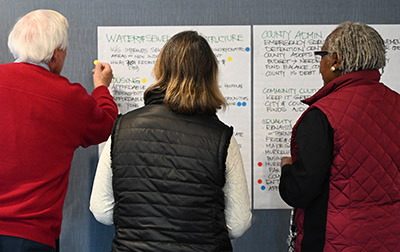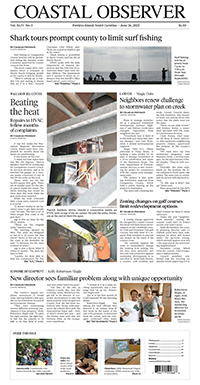Georgetown County
Free easements are no bargain as public works see more delays

To get to its goals of job creation, workforce development and affordable housing, Georgetown County has to go through places like Bent Tree Lane. It was underwater in the “1,000-year flood” of 2015. Efforts by the county to improve drainage in the area were underway when the neighborhood off Martin Luther King Road flooded during Hurricane Florence in 2018.
Those improvements were put on hold because the county couldn’t get the easements it needed for the drainage project. They remain on hold, near the bottom of a list of over 80 public works projects.
Bent Tree Lane is not unique.
“It’s all over the county,” Administrator Angela Christian said. “The situation has gotten a lot worse.”
She got the backing of County Council at its annual planning retreat last week to start using eminent domain to secure easements. That reverses the long-standing county policy of not paying for easements for public works projects.
“We’re dealing with issues like flooding, paving of roads,” Christian said. “What do we do?”
“It’s time we take legal action,” Council Member Bob Anderson said.
Council Member Stella Mercado agreed.
“It’s time to start thinking about the greater good,” she said.
Christian estimated about 60 percent of public works projects involve easements. She added that the county has more unpaved roads than paved roads. Some have sat on the list of paving projects for years.
“We haven’t been able to make a dent in some of these requests,” she said. “Money’s not a problem for these projects.”
It comes down to easements for construction or maintenance.
Clearing up the backlog of projects will allow the county to work on the items – job creation, workforce development and affordable housing – that emerged from the retreat as its vision for the next three years, Christian said.
Jail funding
Not all of those projects are small.
Construction of a new jail is also on the list. At $67.5 million, it will be the county’s largest public works project ever, Christian said.
She and Sheriff Carter Weaver halted work on the project when cost estimates were received last year. The cost to replace the 30-year-old jail was estimated at $36 million when planning began in 2019. Last year, the estimate rose to $55 million. The construction manager then came back with an estimate of $67.5 million.
The county can’t borrow more than $50 million without getting approval from voters, and it already has about $35 million in outstanding debt. To finance the new jail, it will use “installment purchase revenue bonds,” which avoid the limit on borrowing by creating a nonprofit to own the facility.
The county used the same method to fund its judicial center. It leased the facility from the nonprofit and made payment on the debt.
“Projects like detention centers don’t generally get the voters’ juices flowing,” said Frannie Heizer, the county’s bond attorney. “The jail is just a loss leader. State law requires you to have one.”
Despite the cost of the project, the county is well positioned to finance the jail because of its high credit rating, which will reduce its interest rate, said Brian Nurick, senior managing director at Compass Municipal Advisors, who added that rates on municipal bonds are already down from a year ago.
“When things align, you’re going to want to hit the go button,” he told the council.
To cover the $67.5 million cost, Nurick said the county would have to raise taxes by 2 mills, equal to $2 for every $1,000 of assessed property value.
Christian will talk with the construction manager, M.B. Kahn, about revising the estimates. It may be possible to reduce the scale of the project, she said, which would allow the county to benefit from both favorable financing and lower costs.
It will take three or four months to arrange the financing, Nurick said, and the county will face competition in the bond market.
“It is a little bit concerning to me that this is the investment we’re making,” Mercado said.
But by using the installment purchase bonds, Nurick said the county will still have about $30 million in borrowing capacity available without a referendum as its current debt is retired.
Business fee
The county is also looking at revenue options, including a business registration fee.
A $25 annual fee for an estimated 2,500 businesses would generate $62,500 a year.
“That doesn’t sound like a whole lot,” said Karis Langston, the county finance director. But the registration would help locate businesses that “fly under the radar” on other taxes, such as those on short-term rentals and personal property.
“We’ve beat this around for 20 years,” Anderson said. “It’s not the $25.”
Horry and Charleston counties have business licenses with fees based on revenue.
Langston proposed a flat fee because it would be simpler to administer and have the potential to generate revenue from other sources.
Council Member Everett Carolina recalled that when a revenue-based license fee was proposed previously it generated opposition from the Waccamaw Neck.
Anderson didn’t think the flat fee would have opposition if it was promoted as a way to provide data to emergency services. “We’re just trying to wrap our arms around business,” he said.
Council Member Clint Elliott questioned whether it could lead to people who rent all or parts of their homes to vacationers paying property taxes at the higher commercial rate rather than the residential rate.
“It should because they’re using their home as a business,” Langston said.
There are still questions about the business registration fee to be worked out, Christian said.
“What’s the reason not to do it?” Mercado asked.
“There isn’t any,” Anderson said.




